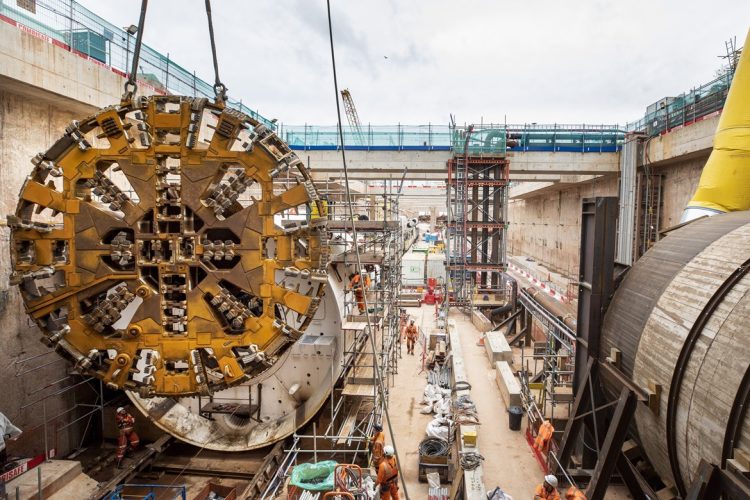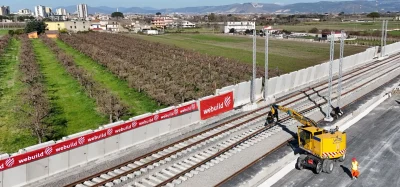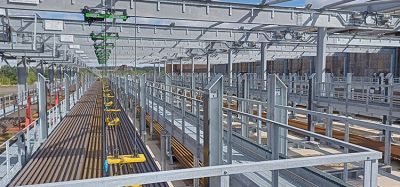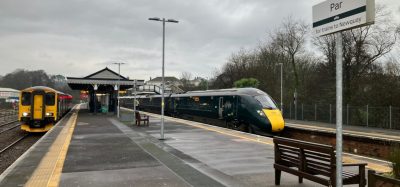Second giant HS2 TBM to start digging under Birmingham
Posted: 14 December 2023 | Emily Budgen | No comments yet
The second tunnel boring machine (TBM) named Mary Ann, has started digging under Birmingham in the next phase of HS2.


A team of 90 specialist engineers have completed the assembly of HS2’s giant tunnel boring machine (TBM) which will start digging the second bore of the 3.5 mile Bromford Tunnel into Birmingham next year.
In an assembly operation to move sections of the machine into a 12-metre deep launch pit, two 600 tonne cranes lifted the huge 125 tonne cutterhead into place at the front of the 125 metre long machine in the pit bottom.
The first TBM, named ‘Mary Ann’ after Mary Ann Evans – the real name of Victorian writer George Eliot who was born in Nuneaton – started digging the first bore from the east portal site near Water Orton in August this year. It has already built more than 500 tunnel rings, which is 0.6 miles of the 3.5 mile long tunnel between North Warwickshire and Washwood Heath in Birmingham.
The name of the second TBM will be revealed before it launches in Spring next year. ‘Mary Ann’ is set to break through at the end of 2024, with the second TBM planned to complete its journey in the middle of 2025.
Both TBMs will remove 1.87 million tonnes of excavated material, which will be sifted at the on-site slurry treatment plant and reused on HS2’s nearby sites at Delta Junction, where a complex network of nine viaducts is being built.
HS2’s Senior Project Manager Catherine Loveridge said: “With the first TBM ‘Mary Ann’ well on her way building the tunnel to take high speed trains into central Birmingham’s Curzon Street Station, it’s fantastic to see the second TBM assembled and being prepared to start digging.”
“We’re now at peak construction, with over 9,750 people working on HS2 in the West Midlands and around 450 people working on this site, including many from the local area. Launching the second TBM next year means there will be more exciting jobs up for grabs for local people,” Loveridge added.
The majority of the second TBM, including the gantries and the centre part of the cutterhead, have been re-used from TBM ‘Dorothy’ after completing the one-mile twin bore Long Itchington Wood Tunnel in Warwickshire earlier this year.
Disassembled sections of ‘Dorothy’ have been moved to the Bromford Tunnel portal site near Water Orton over the last few months, where they have been lowered and reassembled into the underground launch area.
At 8.62 metres in diameter, the Bromford Tunnel is smaller than the 10 metre diameter Long Itchington Wood Tunnel because trains will be travelling slower on the approach into Birmingham Curzon Street Station. For this reason, the TBM needed a new outer part cutterhead and a new shield, which were manufactured by Herrenknecht in Germany.
The full Bromford Tunnel programme is being delivered by around 450 people working for HS2’s contractor Balfour Beatty VINCI (BBV). A specialist tunnelling team, including apprentices working for BBV’s sub-contractor Tunnelcraft will operate the TBM 24/7, with each bore taking around 16 months.
Jules Arlaud, Tunnelling Director for Balfour Beatty VINCI said: “Completing the assembly of the second tunnel boring machine is another major achievement for the team working on HS2’s Bromford Tunnel – a complex section of the new high-speed railway.”
“Getting to this stage has required a huge amount of planning and preparation, including the disassembly and transportation of ‘Dorothy’ parts from Warwickshire, which forms the majority of the second TBM,” Arlaud added.
“Over the next few months, the team will be busy testing, checking and carrying out the final preparations, to make sure the machine is ready to start digging in spring next year,” Arlaud concluded.
The Bromford Tunnel programme includes designers from Balfour Beatty VINCI’s Design Joint Venture, made up of Mott MacDonald and SYSTRA (MMSDJV).
Rosa Diez, Tunnels Discipline Lead for MMSDJV: “Seeing the second TBM in position, ready to start, is a proud moment for our tunnelling team. We have learnt so much from the excavation of the Long Itchington Tunnel by our ‘Dorothy’ TBM, which has helped get ‘Mary Ann’ well on her way through the Mercia Mudstone in the Bromford Tunnel. The learning will continue for this second TBM, which once named and launched next year, will also become part of our family”.
A total of 41,594 concrete segments will create 5,942 rings to make the twin bore tunnel, with each ring weighing 49 tonnes.
The segments are being produced at Balfour Beatty VINCI’s pre-cast factory at Avonmouth near Bristol. In the concrete mix used at the factory 40% of the cement is replaced with Ground Granulated Blast-furnace Slag (GGBS) which has a much lower carbon footprint than traditional cement. 3D scanning is used in the production process of the segments to guarantee accuracy.
More Like This
HS2’s £1bn boost for British businesses
HS2 apprentice takes centre stage at London’s STEM LIVE event
HS2 completes East-West Rail works at Calvert
Related topics
Depots & Shunting Yards, High Speed Two (HS2), High-Speed Rail, Infrastructure Developments, Tunnelling
Related organisations
Balfour Beatty VINCI, Herrenknecht, HS2, Mott MacDonald, SYSTRA (MMSDJV), Tunnelcraft








